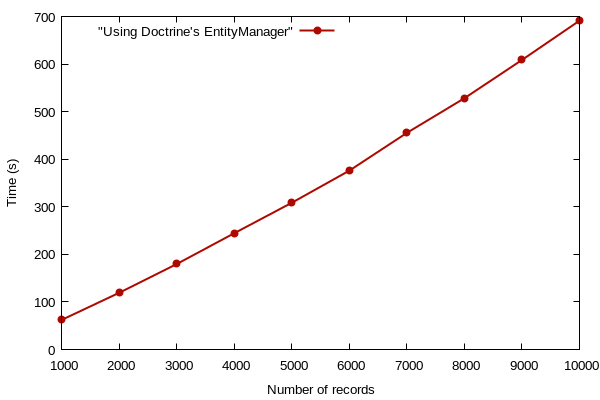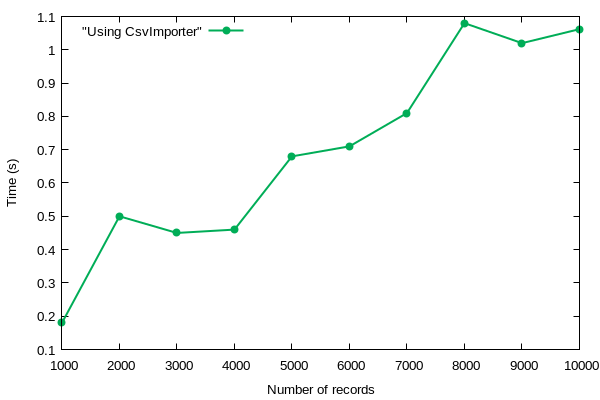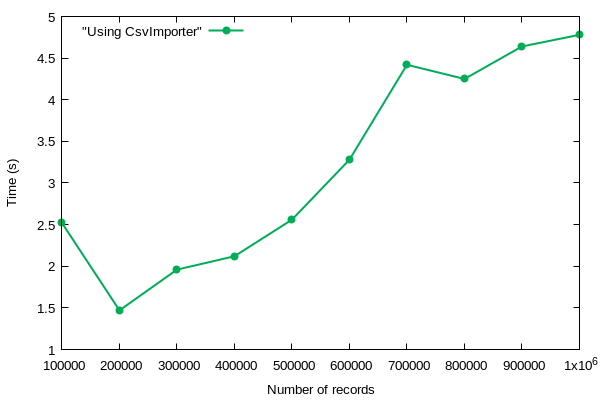mql21 / csv-importer
A tool to import CSV files in Symfony applications
Installs: 146
Dependents: 0
Suggesters: 0
Security: 0
Stars: 1
Watchers: 1
Forks: 1
pkg:composer/mql21/csv-importer
Requires
- php: >=7.2.0
This package is not auto-updated.
Last update: 2026-02-15 14:54:09 UTC
README
ORM's are a helpful tool to operate with database tables in a higher level, through what we normally call "entities" . These, at the end of the day, are just classes. This way we can manipulate instances of those classes that will ultimately be persisted to our DB, without needing to write the entire SQL code.
Surely ORM's such as Doctrine or Propel are great and have their advantages. However, when you need to work with large datasets (i.e. importing lots of records via CSV files), sometimes they are not very helpful. Doctrine has mechanisms for Batch Processing, but still huge datasets can take quite a while to be processed.
This project's main goal is to provide a solution to import large CSV files taking as few time as possible. At this point this project is ready to be used in Symfony (4.3 or higher) applications, however support for other PHP frameworks may come in the near future.
Installation
To install this project, just require the dependency with composer:
composer require mql21/csv-importer:dev-master
Setting up CsvImporter
Before using CsvImporter, it needs to be set up.
First off, you need to allow CsvImporterInterface to be injected as a service throughout your application, add this line to the services.yaml file:
mql21\CsvImporter\CsvImporterInterface: ~
Now configure CsvImporter dependencies, add:
mql21\CsvImporter\Builder\CsvImporterMysqlBuilder:
arguments:
$csvMappingFields: "%csv_mapping_fields%"
csv_importer.mysql_builder:
class: mql21\Adapter\CsvImporter\Builder\CsvImporterMysqlBuilder
mql21\CsvImporter\Adapter\CsvImporterMysqlAdapter:
arguments:
$csvImporterMysqlBuilder: "@csv_importer.mysql_builder"
csv_importer.mysql_adapter:
class: mql21\CsvImporter\Adapter\CsvImporterMysqlAdapter
Then, you can simply autowire the MySQL adapter to your controller, service or wherever you desire in your app:
App\Service\Import\MyImportService:
arguments:
$csvImporter: "@csv_importer.mysql_adapter"
Using CsvImporter
CSV data needs to be defined in services.yaml so that the importer knows what the mapping between the CSV and the database is. To do so, you can define the following config under the parameters section:
parameters:
csv_mapping_fields:
test.person: ## database.destination_table_name
name: ## csv column name
column_name: 'name' ## database table name
required: true ## cannot be empty in csv
surname:
column_name: 'surname'
required: true
All CSV configs need to be defined under the csv_mapping_fields scope.
Now you can inject CsvImporterInterface throughout your app and perform the import as follows:
$csvPath = "some/csv/path/file.csv";
$tableName = "test.person";
$completeMessage = $csvImporter->import($csvPath, $tableName);
TIP: Make sure to always inject CsvImporterInterface in your classes to follow Dependency Inversion Principle.
To see an example of usage of CsvImporter, please visit this repo: https://github.com/miquelp/Csv-Importer-Example
Some interesting data
Note: As you might have noticed, $csvImporter isn't declared explicitly since it's meant to be injected via DI.
As the following chart clearly shows, persisting entities into the database using Doctrine's EntityManager can take some time, especially if we're working with relatively large data sets:
As you can see, it took around 11.5 minutes (691.15 seconds) to write 10000 records only.
However, because CsvImporter writes the entire data using a native query, the time it takes now is almost insignificant:
Also, if we try to import even larger data sets, we can appreciate how import time is pretty low too:
As we can see it only takes around 4.7 seconds to import 1 million records.
Side note: This data was collected from a local MySQL database installed in a computer with 16GB of RAM.
Further work and contributing to the project
Any feedback, fix or contribution to this project is welcome. If you want to contribute please feel free to open a pull request and it will be checked as soon as possible.
Here's a list of TODO's that can be done right now:
- Adding support for related tables. CsvImporter is meant to be used to write data into a single table, so relations aren't implemented yet. It would be interesting to add some sort of mechanism to allow the possibility to write into multiple related tables.
- Adding some unit testing.
- Apply SRP to
CsvImporterMysqlBuilder.phpby extracting validation methods to separate class. - Adding more field validations. At this point, there is only two validations: required and decimal. Any other field validation would be very welcome.
- Making this library framework-agnostic. Now it is clearly implemented to work along with Symfony, but it would be interesting to add support for other frameworks as well.



